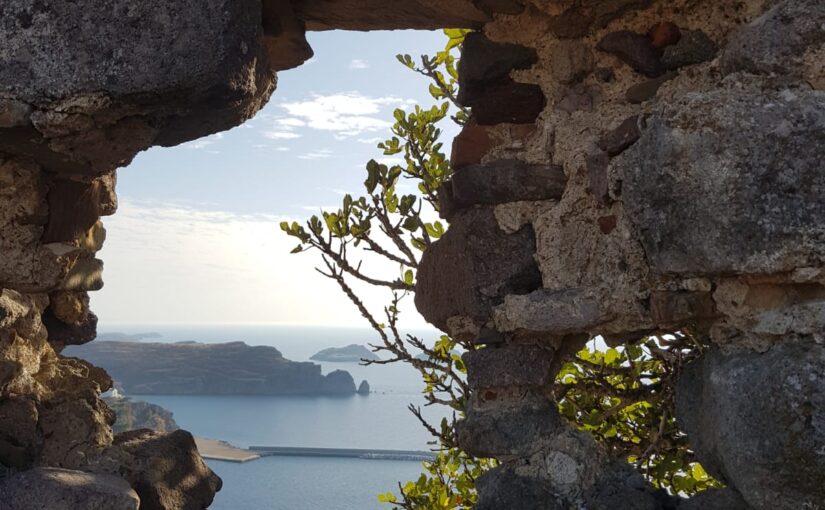Field of study in Wageningen: BSc Environmental Health
Study period exchange: 02/10/2023 – 02/02/2024
Country (exchange): Greece
City (exchange): Mytilene
University (exchange): University of the Aegean
Faculty (exchange): Department of Marine Sciences
2. Motivation for exchange
Why did you choose to go on study exchange?
I wanted to get a different perspective on my studies, and all the exchanges I have done in the past were great experiences that created many close friendships, and made me understand cultural interactions better.
What is the reason you chose for this country/university?
I wanted to go to a country that was quite different from what I was used to (Netherlands, Germany), but I was a bit intimidated by the language barrier in South America and the prices of most Asian partner universities, so I decided to go to East Europe. I wanted to know if the perception of the environment was different and if the approaches in teaching and environmental protection were different. I’m also interested in Marine Sciences, which was the final determinator, as the University of the Aegean offers many courses in that department.
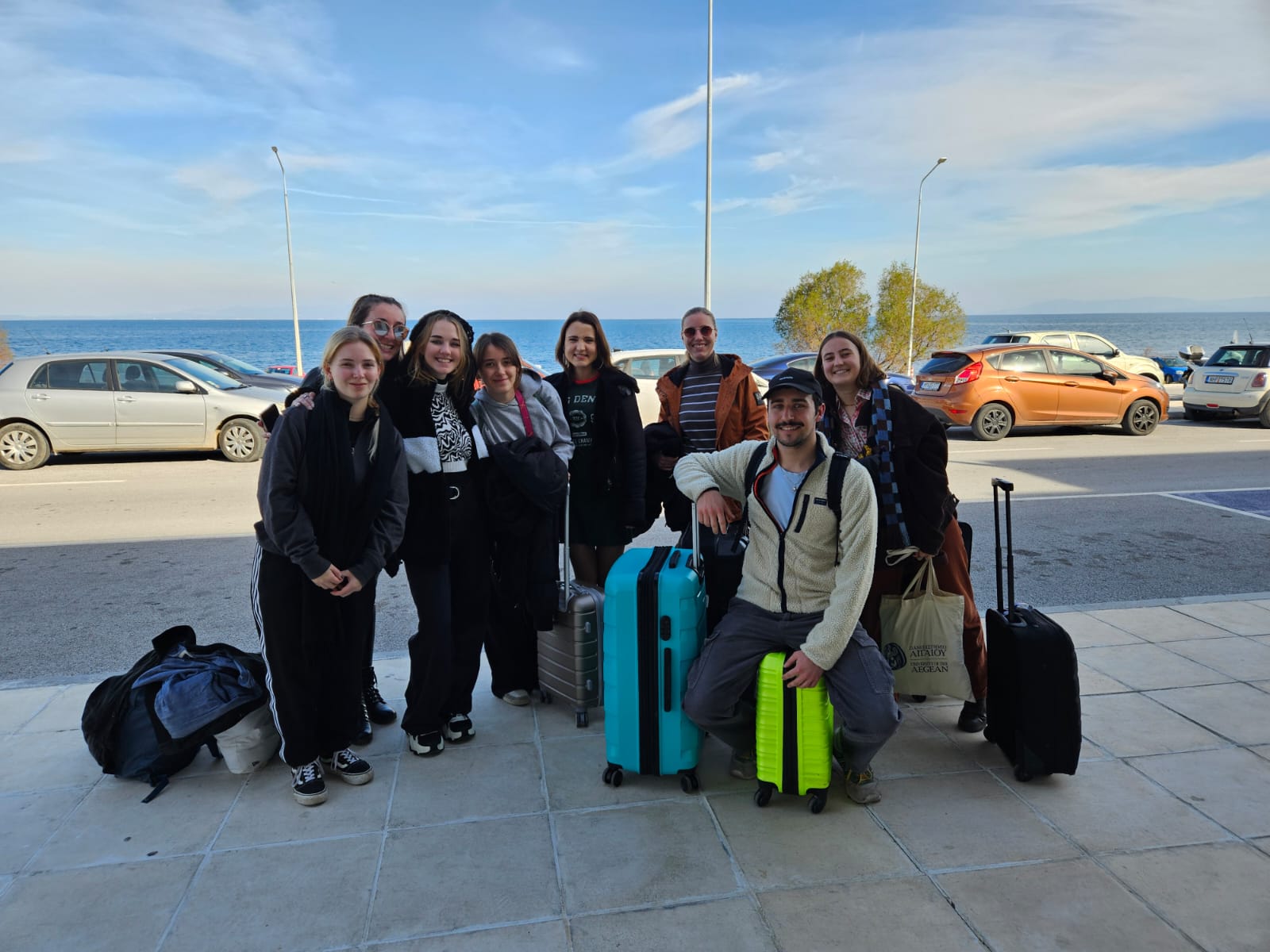
3. Accessibility to reach destination
There’s basically no direct flights to Mytilene, so you have to fly via Athens or Thessaloniki most of the time. When I first went, the layover was quite long so I decided to book 2 separate flights and spend three days in Athens, which was really nice. I gave my baggage to the airport for safe-keeping and slept in a hostel (Nubian hostel). Because Mytilene is a small airport and they have to fly over the Mediterranean, flights are often delayed because of small storms and organizational issues, so I’d recommend either booking the flights together or having a layover time of >3h, I know two people who missed their connection because of that. There’s also the possibility to take a ferry to and from Athens which takes roughly 13h. I booked a cabin with a friend and we went overnight, so that was quite fun actually. The bigger ferries also have restaurants that are quite cheap and have good food.
4. University and studying
Could you provide some general information about the followed courses?

What is it like to study there?
I’d say that the workload is a bit less than at Wageningen, but mostly it’s distributed very differently. Biogeography was quite similar structure- and content-wise, with weekly lectures, uploaded presentations, an article-essay and an exam. Other courses, such as Social Solidarity Organization Forms were different, as only me and a friend took it (from the Erasmus-students). The professor assigned us readings and had weekly sessions in his office to discuss them with us, and both of us had a lot of liberty in the topic we wanted to write our essay on. We had very different backgrounds (Environmental Sciences, Political Sciences) than what the course was about, so he gave us that liberty to be able to combinate the course with our studies. In other courses, the lectures were in Greek and the presentation slides in English, so most of the workload was in writing the assigned paper (for me). At WUR, there is a lot of group work, but in Mytilene I only had groupwork for ‘Data Analysis of Oceanographic Timeseries’. Overall, I wrote more than 30 pages of essays over 4 different topics, which was quite a lot I felt.
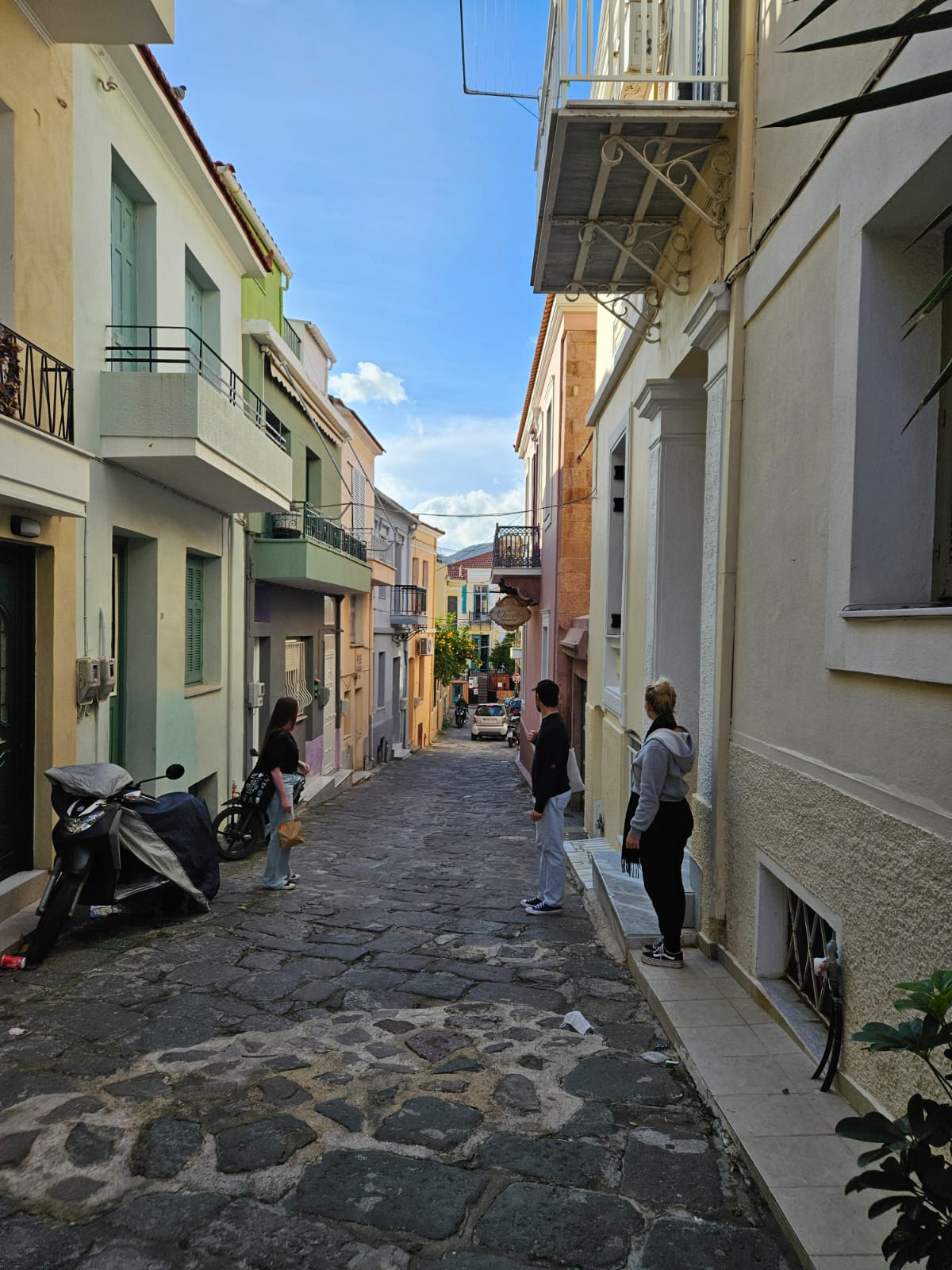
What is the culture of the university?
It depends on the professor of course, but all the professors I had were very friendly and welcoming, and glad to have Erasmus students. The Greek students are also really nice and will totally help you out if you need directions for example, but there isn’t a lot of opportunity to get to know them well because there are no programs or activities from the University that specifically focus on Erasmus students. I also didn’t have a lot of courses with Greek students, so while I had some good conversations, I didn’t really make friends with any of them, unfortunately.
It’s different from WUR in the sense that classes are a lot smaller, so you get a lot of opportunities to talk to your professors if you want to. Students also often have more time on their hands or are more willing to engage in conversation, so normally if you tell someone you’re an Erasmus students that will lead to a 10-minute conversation (at least). On the downside, it is less structured than WUR. Getting a student card took much longer, and I wasn’t able to take all the courses I wanted because some of them just didn’t happen. Overall I think they’re more flexible maybe, which can be an advantage because you can ask for extensions and get a lot of liberty on the projects you want to work on, but it can also be a disadvantage because it makes planning more difficult, schedules can change rather spontaneously, and you might get late responses per e-mail. I’d recommend going in person if you can arrange it, and looking up office hours to contact them.
What does the university offer the student additionally?
There are a lot of clubs and associations (diving, environment, dancing, sports, …) but I didn’t join any. Some of my friends went to the gym, which is 50€ a month or so if I remember correctly.
5. Housing-travelling-living
What are the possibilities for housing?
There are some rooms on Campus, but Erasmus students are not a priority there so you’re unlikely to get one of those. The university provided my with some websites, and while there are a lot of affordable places in the city centre, most of the landowners were looking for people staying for at least a year, so I didn’t have much luck there. I tried Facebook marketplace, but in the end I found a place through another Erasmus student, and I lived in a house together with her and 2 others, which was really nice! If you’re interested in going, don’t hesitate to contact me an I’ll send you the landlady’s facebook post & number.
What is the culture of the country like?
Not sure if I have much to add to what I said already, but it’s a very open and friendly place and people are willing to engage in conversations with you, but making actual friendships with the local community is difficult. Mytilene can be a very busy and a very quiet place, depending on the time of day. In the morning, the streets are bustling with cars and motorcycles (which drive a bit too close for comfort) and there’s people walking around everywhere. Then, around lunchtime, almost everything closes and it’s very still. On certain days the shops reopen afterwards and stay open until quite late, and on others they don’t open at all in the afternoon, which was quite confusing in the beginning. So on Thursday afternoon you might be doing some shopping and the streets are filled, there’s market stands on the streets, food baskets standing out etc., and on Friday afternoon at the same time, the street is completely deserted, windows closed with metal covers, nor motorbikes, nothing. (I don’t remember which weekdays were open and which ones weren’t anymore though) Also there are cats everywhere, and they like to be pet.
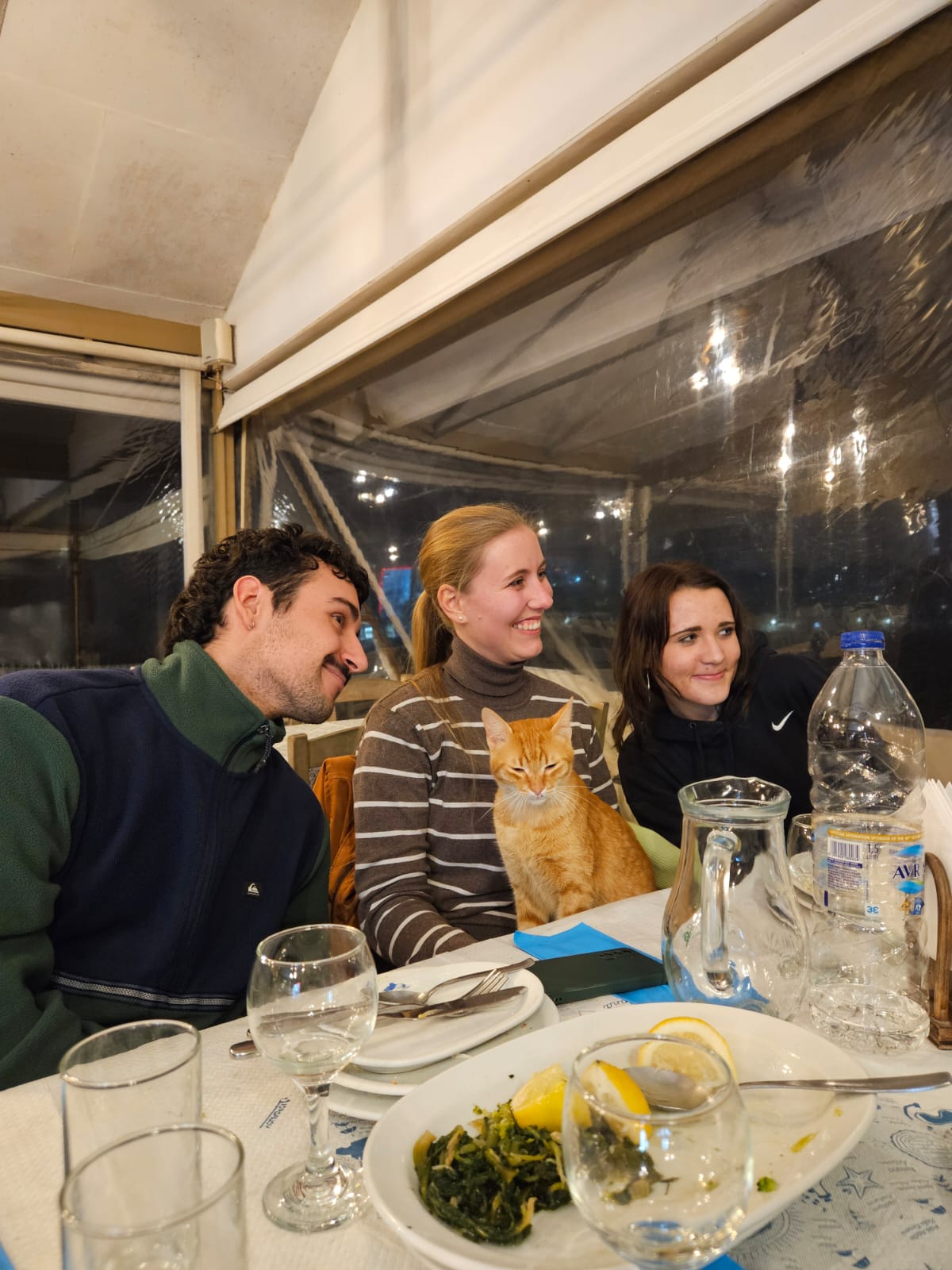
Could you give some information about public transport infrastructure?
There is a bus that goes to University every 30 minutes and is pretty well adapted to the starting times normally, plus it’s paid by the University, so as a student you travel for free! From the city centre it takes around 20 minutes or so. If you want to go to other places, you have to pay but it’s not expensive (no more than 2€), however, the busses are not super reliable. Google Maps has no information on the schedule whatsoever, so you either have to ask at the stand in the centre, or look at their website. I don’t remember the name unfortunately, but they provide QR-codes at the bus stops that lead you to the website. There is also the possibility of renting a car, I write more on that in ‘7. Free Time’.
6. Expenses
Can you give an indication of your expenses for/during your exchange?
Ticket there: depends on when you book it, but ~100€, can go up to 150€ easily. Visa if applicable: – Vaccinations if applicable: – Insurances (extra, if applicable): – Housing costs per month & type of housing/accommodation: 375€/month in a house shared with 3 others. Groceries: cheaper than in the Netherlands, but not by much (I think a lot of it is imported because it’s an Island, so that brings the price up) Public transport: transport to University free Restaurant/going out for dinner: 10-20€ Daytrips/sight-seeing: Museums are generally free if you’re under 24, and entry fees are no higher than 10€ in general. There’s a cinema that costs 8.5€ normally and 7.5€ on Wednesdays.
Additional remarks regarding expenses?
Overall my cost of living was lower than in the Netherlands. Especially with the Erasmus Grant, I had more money to spend on going out, taking trips etc.
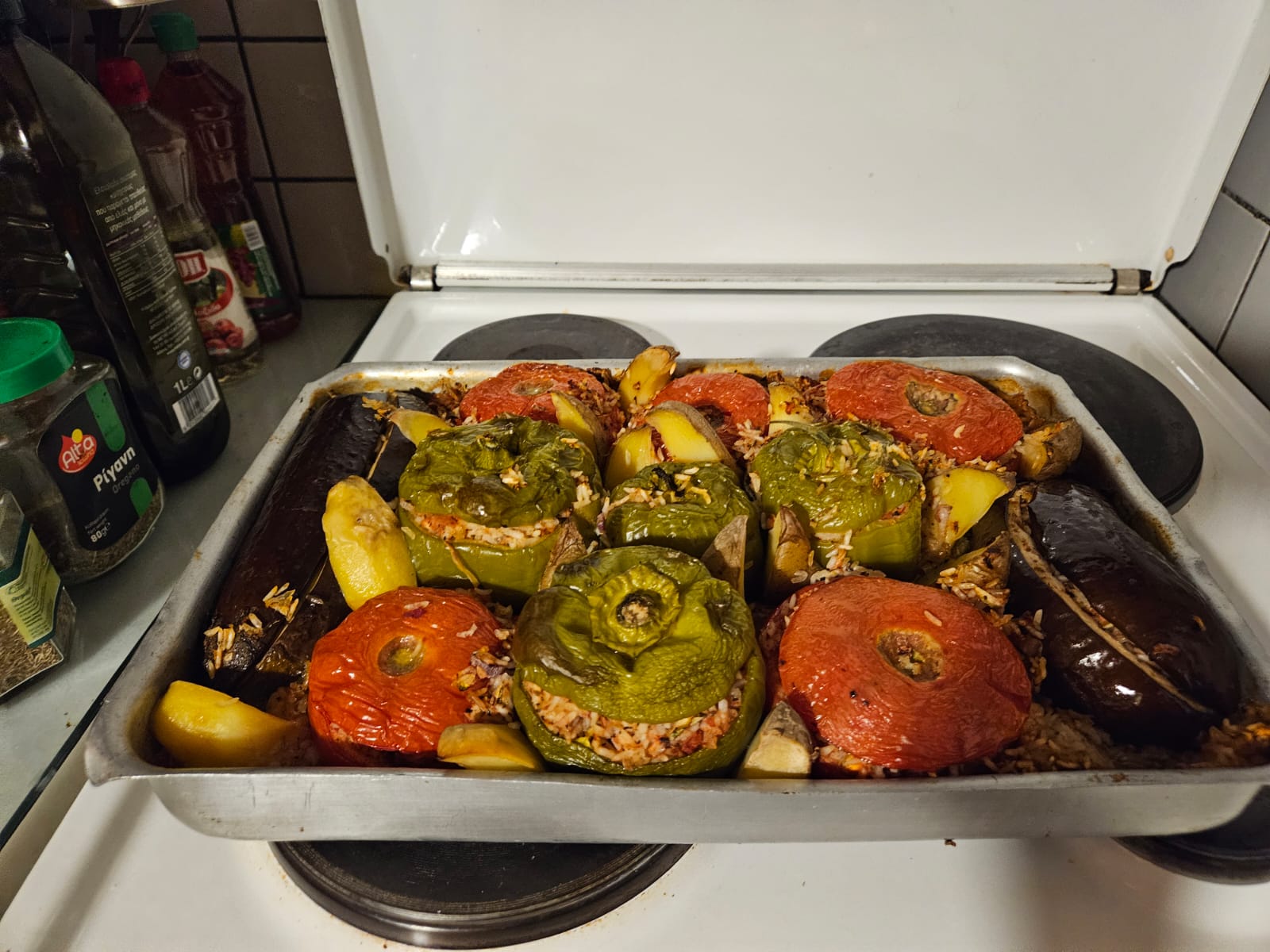 7. Free time
7. Free time
What are must-sees in the area?
The entire Island is really pretty, so I totally recommend renting a car and doing a trip around the Island. There are waterfalls, thermal springs and hike paths to see, and a lot of small rural towns that are very pretty (and very calm in the winter semester). You don’t have to plan it a lot in advance, just maybe call the day before to make sure they have enough cars and are open at the time you want to go. I did multiple car trips with my friends because the Island is quite big to visit everything in one day, so it’s convenient to visit the East and West on different days. Some of the places we went to include the petrified forest (has an entry fee but I’ve never seen anything like it, it’s really cool! Especially if you’re into geology and the likes), the Saint Ignatios Monastery, Plomari, Mithymna, and a lot of other towns that we drove by or drove through.
The other way to travel is by ferry. There are lots of Islands that are only a few hours away and really nice to visit, like Lemnos and Chios. The only thing to look out for here is proper planning, the ferries only go a few times per week (or very early and very late in the day) and car rentals might only have a few cars (we made the mistake of travelling with the whole group, ~20 people). I didn’t rent a car when we went to Lemnos but stayed in the city centre and visited the castle, but some friends of mine visited the salt lakes which they said were very pretty. We also visited Izmir in Turkey, which required a lot more planning, and I’d recommend travelling in a smaller group and buying a sim-card beforehand. Also another note on car rentals: it’s around 30€ per day, but you have to have had your licence for a few years and the age limits vary a lot, sometimes it’s 21/22 and sometimes it’s 24/25, so just try out different places.
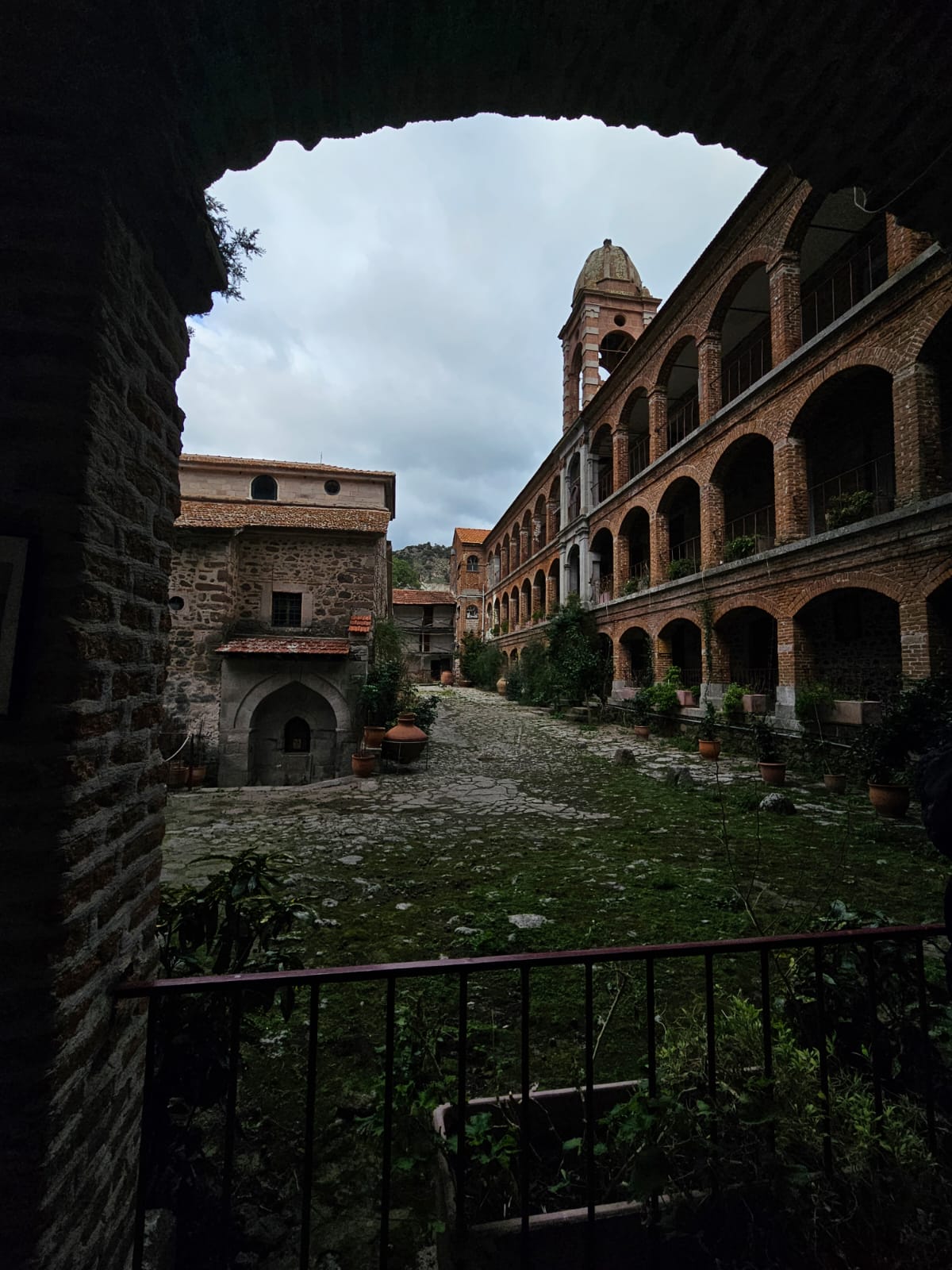
What does not appear in a travel guide, but is definitely worth a visit?
I can’t think of anything right now, but it’s always worth it to ask your professors or Greek friends for recommendations, and I think we discovered a lot of nice places by just walking and driving around.
7. Challenges & best moment abroad
What challenges did you encounter and how did you overcome them?
Personal: Home sickness and being ‘alone’ in a new country.
After 2 weeks, the excitement of getting to know so many new people wore off and I just really wanted to have a conversation with someone that actually knew me, instead of having to forge new connections all the time. Part of that was also living together with three people after having lived alone for 2 years, and all the social interaction wore me out a bit, so I spent some alone-time and felt a lot better afterward. Once I got comfortable with my roommates and the dynamics settled, living with them was one of the best parts of my exchange 🙂 I still was homesick every now and then as I’d never spent that much time without seeing my friends and family, but I knew it was only temporary and compensated that with calling and texting them more. Also, everyone is in the same boat, so it’s really easy to make friendships with the other Erasmus people because all of them want to go out, spend time in cafés, at the beach, go for a walk, meet for dinner etc. Planning meetings & spontaneous get-togethers were much easier there because my social circle was much smaller and everyone had a lot of time on their hands.
Educational: Lack of a proper study place, switch from periods to semesters.
On contrast to WUR, there are not study rooms you can book at the University of the Aegean. There are computer rooms you can just go in to do you work, but it’s not ideal if you want to work with other people. There is a small library, but it’s made for borrowing books and not for studying. Because of this, I ended up studying in cafés (Alley Dog, Palia Agora, Musiko) a lot, which worked quite well for me, and oftentimes I ran into other people there so that was quite nice. I also studied at home in my room or with my housemates in the living room, and even sometimes outside on the balcony, but frankly none of these places were ideal. With the period system, normally I only had 1-3 courses at a time to keep track of, and only for a period of 2 months. Suddenly switching to 7 courses meant it was quite difficult for me to keep track of all of them at the same time, and there was a lot of self-study and making-your-own-schedule involved.
Organizational: Documents.
I left the Island pretty much after my last course because the semester at WUR started soon after, and that caused a lot of difficulties with my transcript of records and the statement of the host University. I also took courses from several departments, so all of my professors had to send my grades not only to me but also to the secretary of my department, which only some of them were aware of. I’d recommend starting the process of your documents before the end of your courses, or else staying a few days after to make sure all your grades will be sent and that you have all the necessary documents. Also, as I mentioned before, not all the courses that I wanted to take ended up happening. I’m happy with the courses I took, but it’s definitely something to look out for: you might have to change almost half of your courses once you get there.
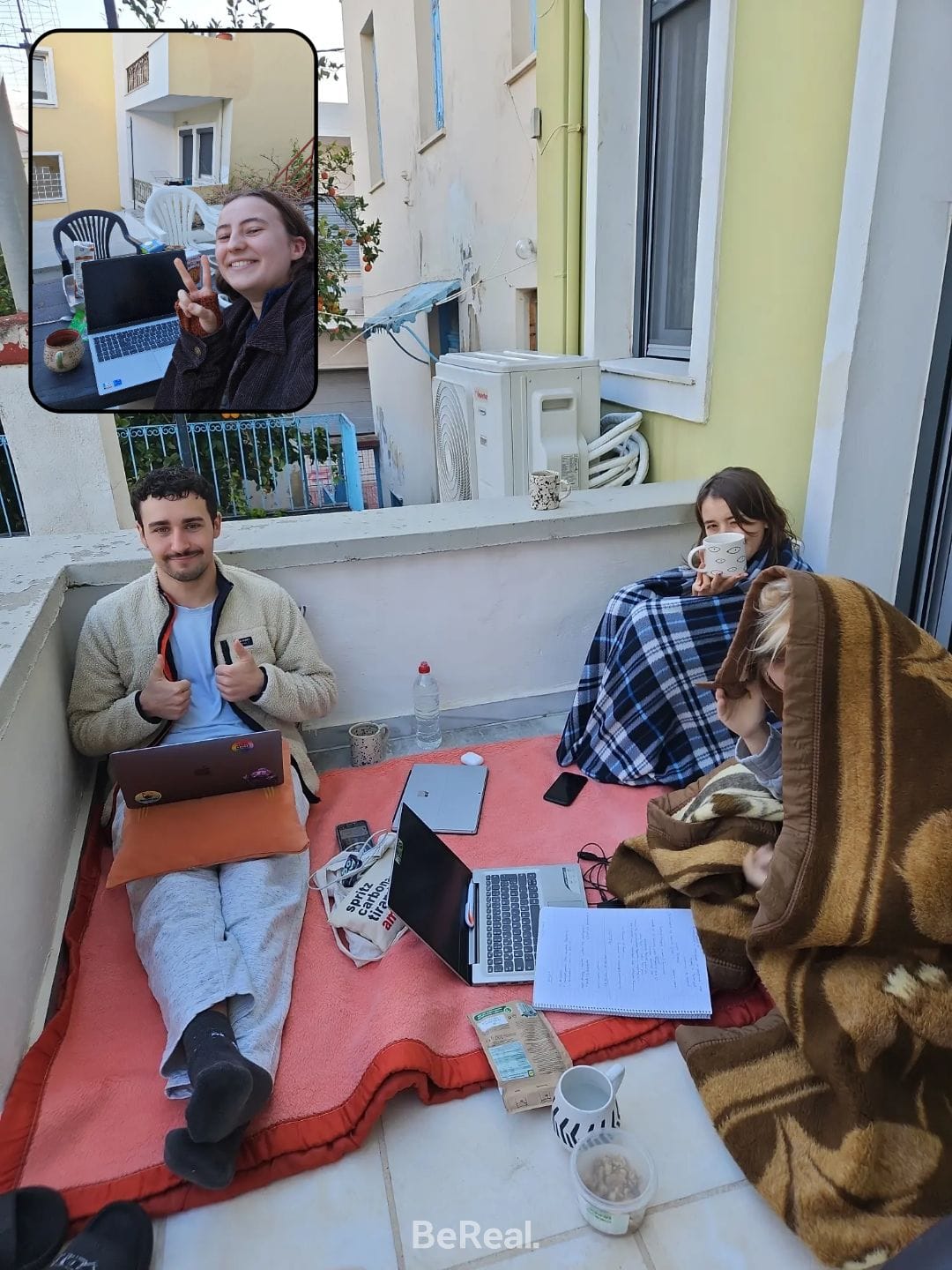
What is your best memory of your time abroad?
I have so many lovely memories, it’s hard to choose. All of the trips I took were amazing, but I also really liked the city itself. I think it’s more of a continuum of good moments rather than one outstanding memory, but here are some snapshots:
-
- studying at Palia Agora and bringing my crochet stuff, only for a cat to fall asleep on my yarn and take a nap there
- swimming in the sea with my friends multiple times a month all throughout the winter, laughing and screaming in the cold water
- calling my roommates on New Year’s Eve because two of them stayed there over Christmas, and me and another one went home
- drinking Sangria and having conversations on the kitchen floor until 3 in the morning
- inviting all the Erasmus people over to our house for a big party
- inviting our friends over for dinner
- friends spontaneously coming by to hang out at our place
- one of our Czech friends making Langos herself for all of us
- taking turns cooking dinner in the house, and getting to try recipes from 3 different countries
- so many good conversations on cultural differences, and language similarities between Polish, Czech, and German; so many good conversations on a lot of things really
That’s only a few, but it truly was such a nice experience :).
8. Contact Details
Would you like to ask Aline more questions about her exchange?
Send her a mail: alinenegrea@gmail.com

